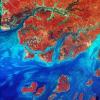The detection of three Zika virus infections in Guinea-Bissau in Africa has sparked an investigation to see if they involve the strain implicated in the outbreak centered in the Americas, and Spain became the latest country to report a sexually transmitted case.
Guinea-Bissau appears to be the 62nd country to report mosquito-borne Zika transmission, and Spain is the 11th country to report sexual spread of the virus, according to a running tally of affected countries in the latest updates from the World Health Organization (WHO).
Positive tests trigger further testing
Three of 12 samples from Guinea-Bissau were positive for Zika virus based on lab tests in Senegal, which weren't able to determine the exact strain, the Associated Press (AP) reported yesterday, citing WHO spokesman Christian Lindmeier.
The WHO has been in touch with Guinea-Bissau's government, and officials are further investigating whether the viruses detected are the same ones fueling outbreaks in countries such as Brazil.
Concerns about the threat to Africa have been rising since genetic tests on Zika samples from Cape Verde, located off the coast of Africa, revealed that illnesses there were due to the Americas strain and not the African strain as previously thought.
Among the many unanswered questions about Zika virus are whether previous exposure to the African strain, thought to have circulated in Africa for many decades, offers any protection against the Americas strain and whether features of the Americas strain make it more likely to cause birth defects such as microcephaly.
Spanish sexual transmission
Spain's health ministry announced the country's first known sexually transmitted case, involving a woman who got sick after contact with her male partner who was diagnosed as having a Zika infection after he returned from an unnamed Latin American country, according to a Jul 1 report from Reuters, which cited health authorities in Madrid, where the case was detected.
Health officials aren't sure how much sexual transmission of Zika virus adds to the disease burden, but recent studies suggest it could play a larger role than previously thought.
Madrid officials said the woman's partner had returned from a visit to Latin America in late April or early May. Spanish media reports have said the woman is not pregnant, according to Reuters.
Zika disinfection, WHO breastfeeding update
- Classical disinfectants and inactivation methods can destroy Zika virus, and nitrile and latex gloves are protective, according to a series of experiments by German researchers who published their findings in a Jul 1 letter to Emerging Infectious Diseases. The ultraviolet light of a laminar flow hood can inactivate the virus, but can take hours rather than minutes if the virus is in a protein-rich environment, the investigators found. They said the findings weren't surprising, but they wanted to do a thorough verification to weed out uncertainties about the emerging pathogen.
- The WHO yesterday said it has updated its guidance on breastfeeding and Zika virus, according to an e-mail to journalists. It said its recommendations have not changed since they were issued in February, but the update adds evidence to support them. The WHO has said there is no evidence that Zika virus can be transmitted through breastfeeding, but more research on the possibility is needed.
See also:
Jul 4 AP story
Jul 1 Reuters story





















